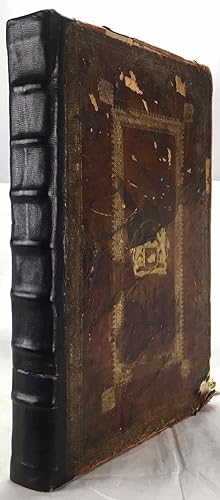Laonikos Chalkokondyles Konrad Clauser Johannes (1 results)
Product Type
- All Product Types
- Books (1)
- Magazines & Periodicals
- Comics
- Sheet Music
- Art, Prints & Posters
- Photographs
- Maps
-
Manuscripts &
Paper Collectibles
Condition
- All Conditions
- New
- Used
Binding
- All Bindings
- Hardcover
- Softcover
Collectible Attributes
- First Edition
- Signed
- Dust Jacket
- Seller-Supplied Images
- Not Printed On Demand
Seller Location
Seller Rating
-
Laonikou Chalkokondylou Athenaiou Apodeixis historion deka. = Laonici Chalcocondylae Atheniensis historiarum libri decem
Published by Parisiis: E Typographia Regia, 1650
Book
Hardcover. Condition: Fair. Folio. Large paper. Tome 22 (XXII) of the Corpus Byzantinae Historiae, or Byzantinae historiae scriptores, printed from 1645-1711, by order of Louis XIV. Collated: [16], 506, [28] p. 43 cm. Contemporary leather, rebacked on later black leather spine. AEG. Covers well-worn at edges/corners and scuffed. Primitive restoration work. Wear and dulling to edge gilt. Coat of arms to boards of 3 boars heads crowned, 2 lions rampant. Engraved French royal arms on title page. Included is typed English translation of preface. Internally very good; a few stray pencil marks. Crack to gutter of e1, e2 loose, with e3 sprung. Lacks front and end endpapers. Definitive source on the fall of the Byzantine Empire, 1298-1463, covering its invasion by the Ottoman Empire and Venice. Among Greek histories of the fall of Constantinople in 1453, the work of Laonikos (ca. 1430-ca. 1465) has by far the broadest scope. Chalkokondyles recorded the last 150 years of the Byzantine Empire, with extensive sections on the Venetian treachery and conquest. Byzantine - European relations are detailed in his account of Emperor Manuel II's journey to Western Europe to obtain aid. In the 1450s, Laonikos set out to imitate Herodotus in writing the history of his times, a version in which the armies of Asia would prevail over the Greeks in Europe. The backbone of the Histories, a text written in difficult Thucydidean Greek, is the expansion of the Ottoman Empire from the early 1300s to 1464, but Laonikos's digressions give sweeping accounts of world geography and ethnography from Britain to Mongolia, with an emphasis on Spain, Italy, and Arabia. Following the methodology of Herodotus and rejecting theological polemic, Laonikos is the first Greek writer to treat Islam as a legitimate cultural and religious system. Significantly for the later concept of Greek nationhood, Laonicus explicitly linked the ancient Hellenes with medieval Greece. Reissue of the 1615 edition, which combined Conrad Clauser's 1556 Latin text with the Greek text by J. B. Baumbach 1615 edition. Parallel Latin and Greek columns. Brunet I.1435. See: William Miller (1922). The Last Athenian Historian: Laonikos Chalkokondyles. The Journal of Hellenic Studies, 42, pp 36-49. An important history of the last days of Byzantium.


